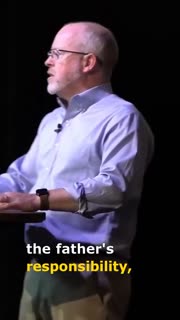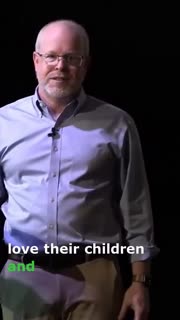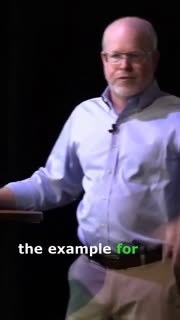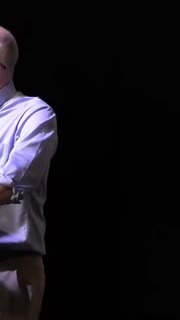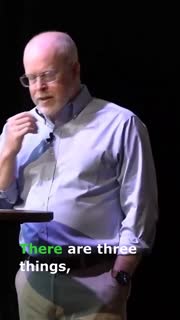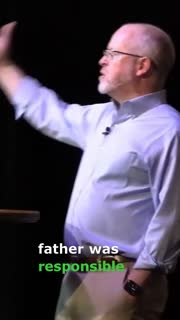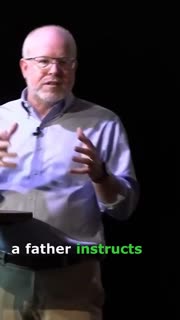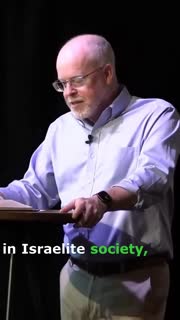### Summary
Blessed are you, O Lord, our God, King of the universe, the one whom Jesus called Father, the one whom we call Father. Blessed is your name. You are holy and righteous. You are majestic and enthroned above the heavens and the earth. We live and move and have our being in you. There is nothing that exists apart from you. are worthy of all of our praise, and yet you are as a Father to us, full of power, transcending heaven and earth, and yet you are close by and near, compassionate. We worship you, Lord. We love you, Lord. We pray, God, that we might step into your presence this morning. We pray, God, that we might hear from our Father. For those who are suffering or broken, may you scoop us up in your arms. those who are going through a hard, hard time, may you give us words of advice to encourage us. those who simply need rest, may we find our rest in you, Father. pray and ask all of this in the name of Jesus Christ. Our Lord, amen and amen. Well, happy Father's Day to you. You missed it in the first service. I told some dad jokes, and bless his heart, after about four of them, I said, I have one last one. And Branson Miller said, just no. Just no. He wasn't wrong, but it was funny nonetheless. Nonetheless. So I'll spare you for those now. But if you have your Bibles. If you'll turn to Deuteronomy, the fifth book in the book of Moses, or the fifth in the Old Testament. Deuteronomy 1, 31. We're going to back up and read from verse 29. Because they hate it when I do that. But it gives us a little bit of context, and we'll go there. 1, 29 through 31 is what we'll read. Here's what it says. Then I said to you. Do not be terrified. Do not be afraid of them. The Lord your God, who is going before you, will fight for you as he did for you in Egypt, before your very eyes, and in the desert. There you saw how the Lord your God carried you, as a father carries his son, all the way you went until you reached this place. The word of God for the people of God. Thanks be to God. So this passage. This passage is part of a greater unit of 1, 6, Deuteronomy 1, 6, through chapter 2, verse 2. And it is Moses recounting redemptive history in the life of Israel. He goes through different periods. He doesn't tell all of the events and everything precisely. But he gives them a picture. And when he gets to this part, it's in the middle of the redemptive story of how God brought the Israelites out of Egypt. How they went into the desert. How they journeyed from Egypt into Kadesh Barnea, which was kind of the gateway into the promised land. And he recounts how Moses says how they said, let's go send some scouts into the land. And he said it seemed like a good idea to him. And so they sent the scouts into the land. You remember the story. They came back and said, the land is exactly as God said. Except there are people already. There and they are much more powerful and mighty. And their cities are greater than anything we've ever seen. And we cannot go against them. We cannot overcome them. And he says, even though I said to you that the Lord would do for you here what he did in Egypt, you didn't believe him. You didn't believe him. That he would carry you as a son is carried by his father all the way to that place. In other words, the Lord is going to be with you, but they didn't believe it. So Moses says, because of this, that entire generation did not get to go into the promised land. And furthermore, I became angry on your account and I was not able to go into the promised land, if you remember. So Moses has written all of these things to them. But in the middle is that little verse, as a father carries his son, so the Lord will carry you. All the way to the place that he's sending you. There are two stories that I was thinking about this week. One in particular yesterday, but another had been on my mind. Two stories of my sister and I. The first story was when my sister was little, we lived on 40th Street. Some of you brave souls have gone to that place and seen and were, as all of us, not quite that impressed. But anyway. There was, along the side, in between two houses, they had fenced their yard and the slats and the fence kind of did this.
And so it was a different kind of design, but we would sit on that or we would use it as a backstop and play kickball in between the two houses. So it was probably about 25, 30 feet wide in between and that fence kind of ran along the side. And one day we were doing that and my sister was sitting up on the fence. And my cousin, yes, that cousin, Cousin Dave, kicked a soccer ball, didn't mean to, but accidentally hit her and she fell backwards and caught herself and then fell forward and her leg, one of her legs was in that slat, yeah, and so she broke her leg. And so I remember being pretty distraught about that and I remember everybody getting her down and I remember my dad coming out. And scooping her up and carrying her away. And so I remember that story very vividly. I also remember many of you, I've told this to many of you, when I was younger I had seizures when I was in fifth grade. And I remember, well, I remember my mother telling me, I don't remember this. But in fifth grade, the way it all started was we'd gone to bed for the night and my dad heard a noise and he got up. And he said he went into the bathroom and I was being ill into the bathtub, he heard me. And he tried to get my attention, couldn't get it. And he said, my mom told me that my eyes were clicking left. So I was seizing and just kind of sitting there. And so when I told him, dad, there are bugs all over the walls, they called the doctor and told him they were coming to the emergency room, I think. And they jumped in the car and my mom drove and my dad was holding me in the bathroom. And my dad was sitting in the back seat telling me to breathe. Breathe, Adam, breathe, breathe, Adam. I guess I was not breathing or something, but he just kept saying that all the way there. Remember my, so those memories came to mind when that scripture is talking about how a father carries his son or carries a child when they're injured. That's what we do, isn't it? When our kids are hurt. If we can tell that it's a serious injury. Then we. We pick them up. If not, we do what all dads do. Oh, just rub some dirt on it. Oh, you're okay. You know, that kind of thing. But when we can see that it's real, just, we just don't hesitate at all. We act immediately. And that's the picture here. That's the picture of God as a father to us. I want to give you a picture of what it meant to be a father in the time that Moses writes this and carrying through. Now, it's going to be. It's going to be different because obviously we did live in two different worlds and we have two different ways of doing things. And there are a lot of things culturally that have shifted in ways that were not present at the time. But to give you an idea of what the responsibility of an Israelite father was. I want to read to you out of this, this particular passage out of this Bible dictionary by Alan. Written by. Alan C. Myers, he says this in Israelite society, the father was the head of an extended family, which resided with him and which reckoned descent through his line, meaning they're all related. It's the sons and their wives lived with their father and mother. His authority was absolute and included the responsibility of securing wives for his sons and contracting marriages for his daughters. was to be honored and obeyed and serious infractions might incur capital punishment. Now, why all of that? Because women could not inherit at that time and women could not typically do the jobs that men did. It was not like today. It was not a world like today. And so it was a responsibility of the father, not just for his own. Family, but for extended family and even cousins and nephews and those who needed a living. The father was responsible to provide that for all of them. It's why when when inheritance laws and inheritance was being handed out, if there were, say, three sons that inherited, the first son would get a double portion of the inheritance and the other two a single. And that was because. The eldest son was then responsible to take care of his brothers and their families, so he had to have more resources in order to carry that out and and the instructions and the pressure or the instructions coming from due to the pressure and the responsibility that a father had over this extended family were not to be disobeyed. He had the responsibility literally of life and death over his family. And they took that very seriously in the midst of all of that, a father was to love and care for his children, disciplining them and instructing them in the faith. The father was the one responsible for the observation of religious festivals and feasts. It was the father who initiated the family to to respond to those and participate in those. It was his responsibility. For the religious education of his children, and he provided for his children's future by an inheritance and accorded sons and the dowry provided daughters in law. Those sons were then responsible for their families, for extended cousins and nieces and nephews, for for those who were ill, that they might even take in the fatherless people who had lost their father and thereby their means of existence. He judged in wonder and rebuke. And then he proved that the fatherless are those who are sovereign and unparalleled, And so a father, he also gave us the word of God as literally everything that He had known. And it's so simple and cute according to some of the above, if you think about the one yang, let me read that to you in a minute, that's a holy book. Let me read it to you on the second page, because I would have thought it would be like a history book, like me say something interesting, like where we say, man, I'm like, I eat seemedsl avo dogs or something. father could be food, or he could be anything. You would have such a finery for him, but if you read this book and the doctrine was written and don't forget, you're just going to rebuke and expiate his doers. us, the way that we learn how to be fathers is by watching our fathers. And we, when we watch them, we learn what to do. And then in some cases what we shouldn't do, but we can always learn from our
fathers. Maybe you had an uncle that was like a father, or maybe this was your grandfather who raised you. Regardless, we watch their example. We pick up their mannerisms and in many cases emulate their behavior. And you know this when you start to scold your children and you recognize about halfway through the scold that you sound exactly like your parents. Do you think I'm up here just talking to hear myself? Oh no, I sound just like my father. We catch that behavior. We are disciples of our parents. But the example for this and the one that we emulate, the one that we should, really look to is God as father, the Lord our God. God was recognized as the father of Israel. If you look in Isaiah, if you look in Jeremiah, if you look in Hosea, you will see a lot of references to God caring for, carrying, providing for, speaking to, discipline, disciplining all the people of Israel and Isaiah in particular. The prophet calls Israel God's son, refers to him in that language. And so there is all of this language about God being a father to Israel, being heartbroken when Israel disobeyed, chastising or rebuking Israel, disciplining Israel, caring for Israel, being faithful to Israel even when Israel was faithless. Just like the human father, God possessed ultimate authority, even over all of the families of the earth, but demonstrates, not just says, demonstrates his love and care for his children. And it doesn't just stop at the Old Testament. There's a picture of fatherhood that goes into the New Testament that is carried, that tradition and that culture is carried forward into the time of the gospels. And there's this picture of God as a father caring for Israel as son. In fact, Jesus outlines when his disciples say, we want to pray like you do. Teach us how to pray like you do. How does he begin? Our father, our father. There is a connection and a closeness. Jesus' nature as only begotten. God and son ties in closely to Isaiah's picture of Israel as son. Jesus urges his disciples and us to approach God as a tender father. It's a picture of a great king on a throne and in the middle of court, in the middle of proceedings, a small child runs in and hops in the lap of his father. Because he gets to do that. Because he's a son. That picture that's carried out in there. Both the Old and the New Testament that show us the character and the nature of God and the responsibility of fathers to their children and their families. And so we don't have similar situations now. In fact, families operate very differently. Sometimes the husband is the sole provider, but sometimes it's a team effort. Or sometimes the... The wife is the sole provider. But no matter what happens, it is a picture that we're looking for in answering that question. How do I be a godly father to my children? How do I treat them as God treats me? There are three things, I think, in the Old and the New Testament that the scripture teaches us about being a father. Three traits that fathers have. You might say there are more than that, and there probably are. But there are three that just seem to really step out that I want to leave with you. As you consider that question, men, how do I become a godly father to my children? Well, the first thing that we see is that a godly father loves. Loves. And when we say love, we mean compassion and care. And care. And honest. Honest. Concern for his children. A godly father loves his children with a love that doesn't say, because you did something, I will love you. But even if you didn't do something, I will love you. It's not conditional. It's unconditional. When my kids were smaller, I would tell them I love them and I was proud of them. And occasionally they'd ask, why? And I would say, because you belong to me. There's no condition on that. Because God loves us as his children. Even when we don't do what he calls us to do. He has compassion and care. The scriptures are full of examples of God talking about how he cared for Israel. He watched over them. And as we read in Deuteronomy 131, carries them. When my daughter was young, I had the unfortunate task, maybe you've done this. Of taking her to the doctor to get her shots. And being the good parents that we were, we were behind. So she had to get four. I don't know if you know about this, but when they're young like that, they don't have enough muscle in their behinds. So they have to give them in the thighs. And so here I am as a father taking my daughter. I know what's coming. She has no idea what's coming. And we go into the doctor's office and they tell me what they have to do.
We're going to have to do two in each leg. And I'm just like, this is not going to go well. This is not going to, I'm starting to just feel guilt. And so she lays down on the, on the kind of the gurney where they're going to do all this. And they say, Mr. Thornton, you're going to need to lay across her. Because we don't want her moving. And so I laid across her body. And my wonderful daughter looked at me with a smile on her eye and says, Daddy, what are you doing? And I immediately began to sob. Just uncontrollably. And they put that first shot in and she cried and screamed and begged me, Daddy, help me. They're hurting me. And I thought about for about a whole two seconds grabbing a hold of that stethoscope and jerking that doctor's head right off of his body. I thought about doing whatever because that just rose up in me. I couldn't, but I knew that this was best for her. But it broke my heart to have to do that. And right after we got ice cream and whatever else she wanted, I think I bought two new cars or something like that. I promptly took her home and informed my wife that I would never again go and get her shots because I couldn't take it. And so we never did. There are other adventures to be told later. But father loves. They love their children and they love their children when they have to do things to help their children understand, even when it's painful for children. But it's good in the end. Our father in heaven is compassionate. Maybe he allows things from time to time that will form us and shape us. He allows suffering to form us into the image of Christ to to polish the rough edges. In our life, but he does it because it's what's best for us. Father loves the second thing that you see in the Old and New Testament. Scripture talks about is the provision of God of godly father provides for his children. Now, it's different than it was back then. Obviously, the families and the income and the different things they need to live life. We have women in the workplace and we have women taking those. Roles in ways that never happened in the time of Israel, but the father's responsibility, whether he's the breadwinner or whether his wife is the breadwinner, or if it's a team effort and they work together, it is the father's responsibility to ensure that whatever the setup is, that the family is taken care of. Some people call that old fashioned. I call that biblical. If your wife works in a job and you're at home. Gentlemen taking care of the family, then great if you're working and your wife's taking care of the family, great if you're doing some combination of that, great, but step up and make sure that whatever's happening that your children have what they need to be able to succeed in life. godly father provides for his children, providing support and encouragement. Helping them to reach beyond what's safe to take risks to to go out into life. Godly father supports. His children. Remember a couple of years ago, we were reminded this. We just got back from New York yesterday about 730 in the evening. We had gone there for Melanie's birthday on Friday and also did see our daughter and son-in-law who we don't get to see. Very much because for some crazy reason they moved to Brooklyn and away from us. So we went up there, had a great time, but we were kind of talking about when did
Key Takeaways
Youtube Chapters

